If you’ve ever been frustrated waiting on hold or scrolling through pages for answers, you know why chatbots are a game-changer—they’re designed to give you quick, direct responses without the hassle, right when you need them.
There are two main types of chatbots to choose from: AI chatbots and rule-based chatbots. AI chatbots are like the helpful human rep who gets you right away. They use natural language processing to understand questions and give human-like responses, making them perfect for more complex issues.
On the other hand, rule-based chatbots work through predefined paths, responding based on keywords or a button menu, which makes them great for those quick, straightforward answers we often need.
The best chatbot software out there gives you the flexibility to mix and match both styles, so you can set up a conversational AI chatbot for the tougher questions and a rule-based one for FAQs. Many platforms also come with extra features to make customer interactions even smoother.
So, let’s dive into the top chatbot solutions to help you find the perfect fit for your business.
Before we jump to the list, let’s go through some basics—
What is chatbot software?
AI chatbot software automates conversations with users either by following a predefined set of rules or using conversational AI (artificial intelligence) to make interactions feel more natural. It’s a popular tool for improving customer service, boosting engagement, and streamlining support.
For example, Ninja Transfers, a custom printing (DTF) business, uses Tidio’s Lyro chatbot to provide instant responses to customer inquiries on their website. Whether it’s answering questions about file preparation, transfer methods, or delivery times, Lyro helps Ninja Transfers deliver consistent support around the clock.
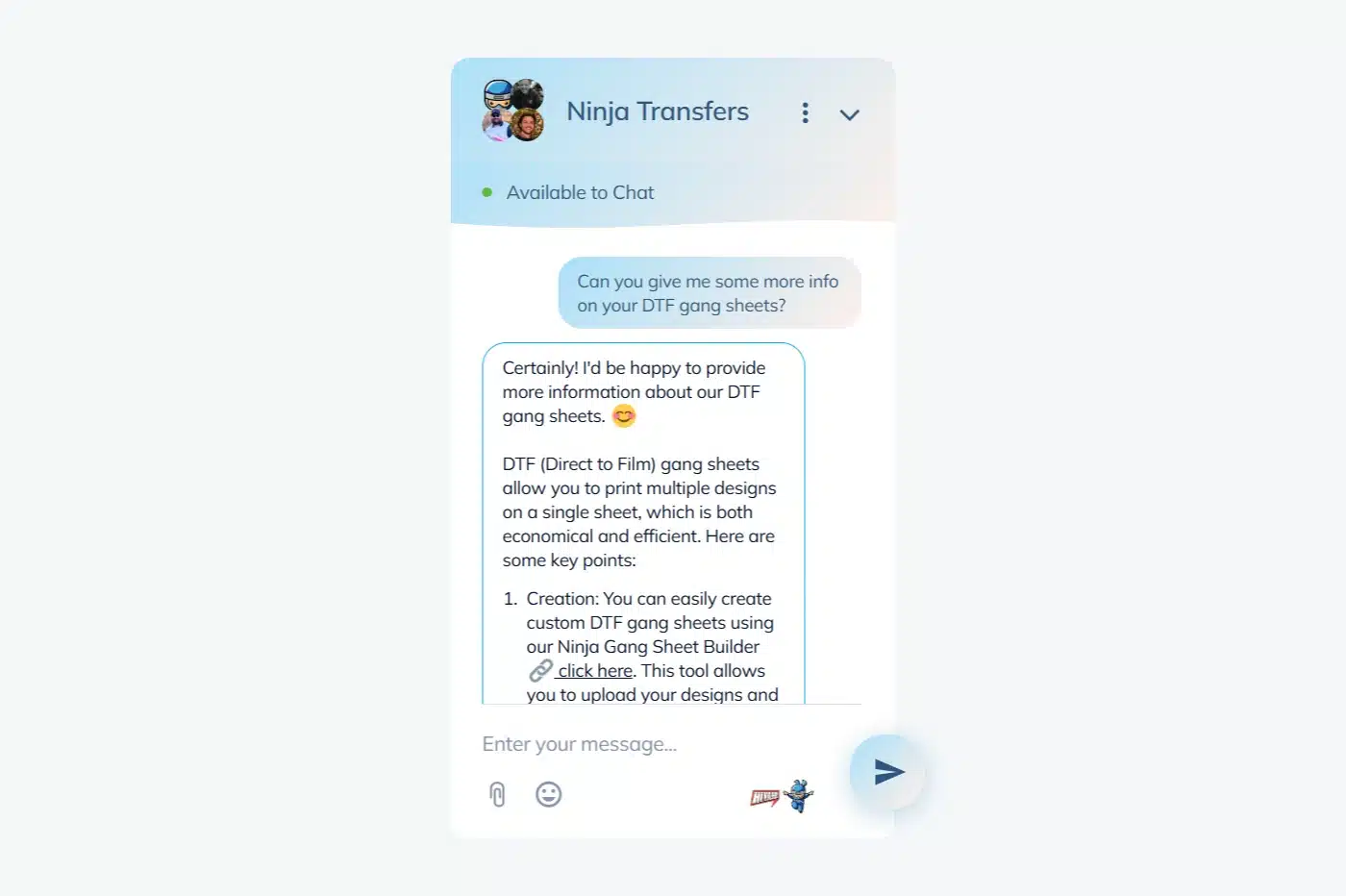
The best AI chatbot software
When choosing these solutions, we focused on what businesses really need to succeed. We looked for tools that offer more than just basic chatbot functionality, like advanced automation features, easy integrations with popular platforms, and scalability to grow with your business. Positive customer reviews and simplicity were also key because no one wants a tool that’s difficult to navigate.
Tidio checks all these boxes, making it a great choice for businesses ready to improve customer service and streamline their processes. It combines rule-based and AI chatbots, like Lyro, to provide responsive, conversational support that’s easy to set up.
With that said, let’s take a closer look at all the platforms:
| Chatbot software | Rating | Free plan/trial | Best for |
|---|---|---|---|
| Tidio | 4.7/5 ⭐️ | ✅ | AI chatbots |
| Zendesk | 4.3/5 ⭐️ | Free trial | Multilingual support |
| Intercom | 4.5/5 ⭐️ | Free trial | Omnichannel |
| Landbot | 4.7/5 ⭐️ | ✅ | Chat pages |
| ManyChat | 4.6/5 ⭐️ | ✅ | Social media chatbot |
| WATI | 4.6/5 ⭐️ | Free trial | WhatsApp chatbot |
| FreshChat | 4.4/5 ⭐️ | ✅ | Activity log |
| Chatfuel | 4.5/5 ⭐️ | Free trial | Facebook chatbot |
| DialogFlow | 4.3/5 ⭐️ | Free trial | Chatbot framework |
1. Tidio
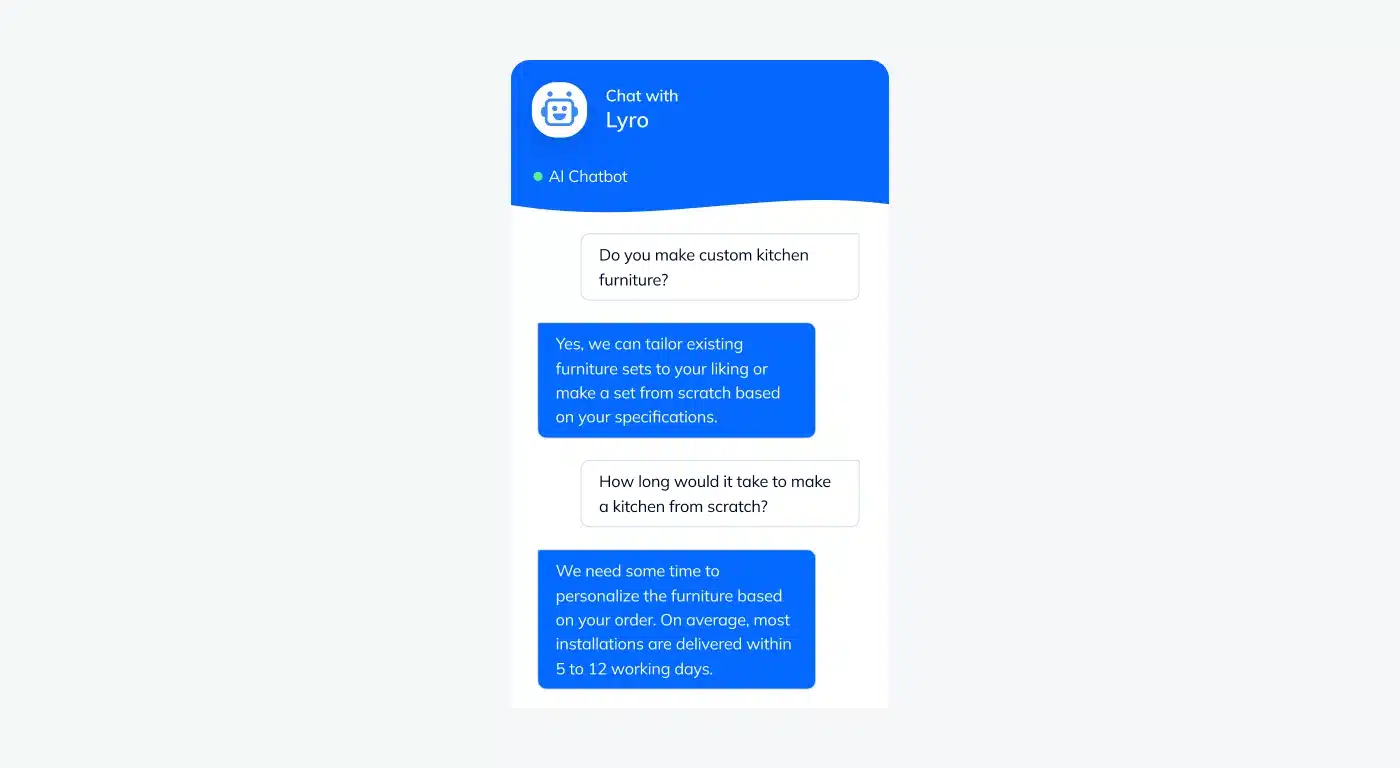
Rating: 4.7/5 ⭐️ (1,560+ reviews)
Tidio is an all-in-one customer service platform that offers AI and rule-based chatbots ( Flows), enabling your business to deliver efficient support across different channels.
One standout feature is our Lyro AI chatbot. It pulls answers directly from your knowledge base to provide real-time support that feels conversational and personalized, even in multiple languages. Lyro AI has an unmatched average resolution rate of 70%, which means it can handle the majority of your incoming chats with the same high level of accuracy as your human agents.
Tidio also lets you customize your rule-based bots using a drag-and-drop visual builder called Flows, making it easy to tailor responses to your brand’s style. In addition, the tool supports a variety of features and use cases, including abandoned cart tracking, conversational marketing, sales automation, live chat for lead generation, and more, making it a robust solution for enhancing customer engagement.
But don’t just take our word for it. Check out Tidio’s user reviews and try our chatbot software for free to decide for yourself whether we deserve this spot on the list.
Main features:
- Lyro AI Agent: Conversational AI for customer service
- Over 16 different live chat triggers
- Drag-and-drop visual chatbot builder
- Multilingual chatbot support
- Ready-to-use chatbot templates
- App for desktop and mobile (iOS and Android)
- Variety of integrations, including Shopify, Facebook, WhatsApp, etc.
- 7-day free trial available
- Free version available
- Starter ($29/mo)
- Growth (starts at $59/mo)
- Plus (starts at $749/mo)
- Premium (starts at $2999/mo)
Get AI chatbots and start boosting your sales today!
Read more: Learn how to use Lyro, Tidio’s conversational AI, to transform your customer interactions. Plus, see how Tidio’s own support team put Lyro to the test, outperforming other AI chatbots on the market.
2. Zendesk
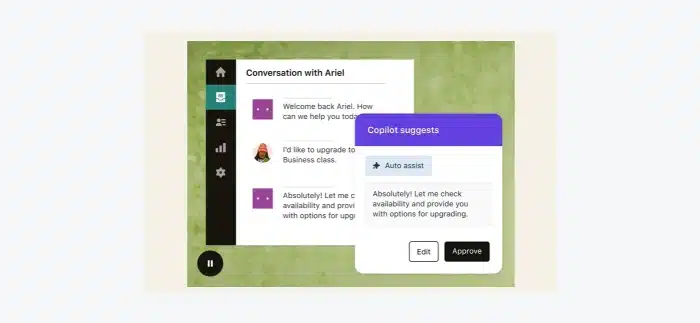
Rating: 4.3/5 ⭐️ (5,900+ reviews)
This customer service and engagement platform offers AI chatbot software that helps you monitor, manage, and reply to your website visitors in real time. Companies—particularly larger businesses— use Zendesk for complex supports needs and to improve customer satisfaction.
On top of that, Zendesk offers a ticketing system, custom forms, automated workflows, and auto-responses to speed up your response time. This way, you’ll provide great customer service customized to your client.
Pros:
- Agent-to-agent chat
- Robust reporting and chatbot analytics
- Over 700 integrations, including Slack, Jira, and Salesforce
Cons:
- Complex interface, can be difficult to use
- Optimized for ticketing and workflows, so their chatbot is weaker in comparison to other platforms
- Reviewers report ongoing issues with the ticketing system
- Free 14-day trial available
- Suite Team ($55/mo/agent)
- Suite Growth ($89/mo/agent)
- Suite Professional ($115/mo/agent)
- Suite Enterprise → talk to sales
Read more: Check out the best Zendesk alternatives on the web.
3. Intercom
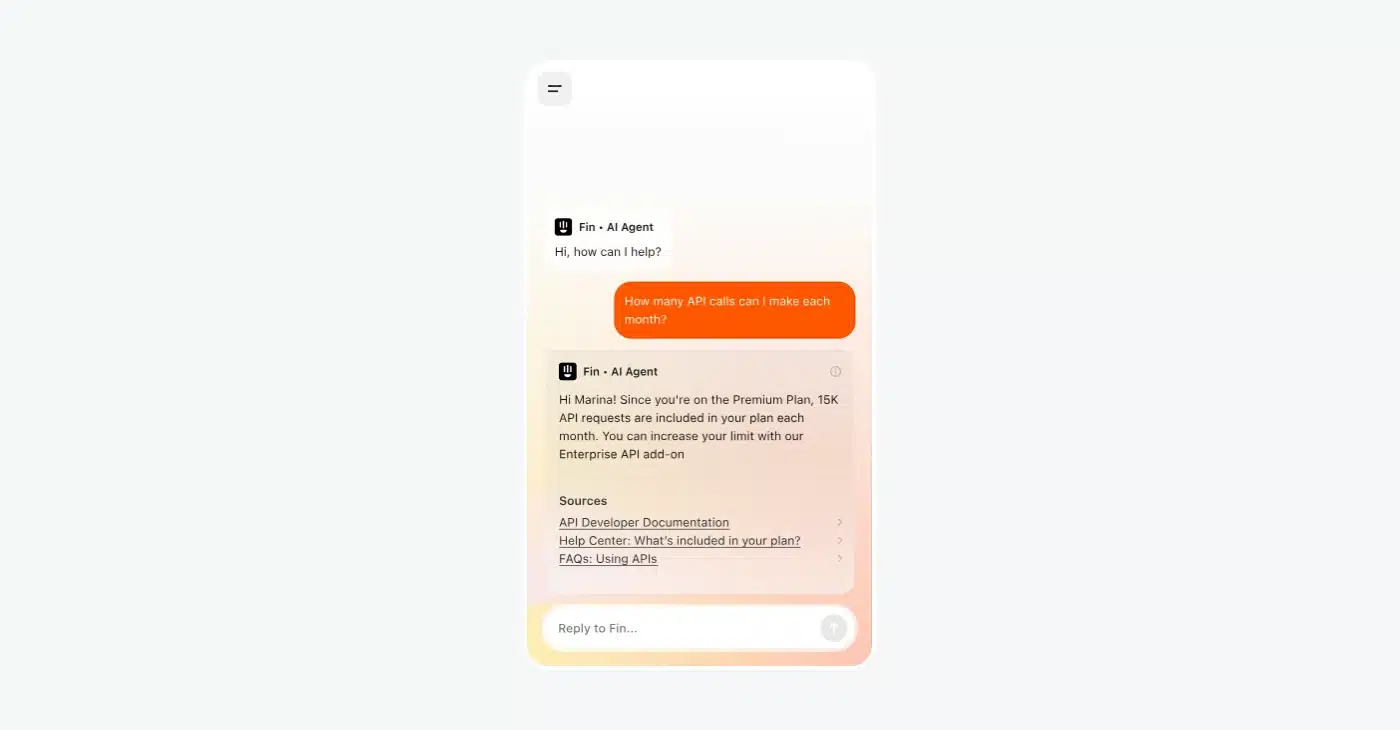
Rating: 4.5/5 ⭐️ (3,250+ reviews)
Intercom is a customer communication platform that offers diverse and adaptable conversational bot software for SaaS businesses. You can use it to provide customer self-service for your website visitors and streamline your agents’ workload.
Intercom’s AI agent Fin has an average resolution rate of 51%, lower than Tidio’s Lyro. Their AI Copilot provides immediate support for agents to streamline their workflows, and the AI Analyst, an upcoming feature, will offer AI-driven insights and recommendations for support leaders, enabling more strategic decision-making.
Pros:
- Multilingual chatbots
- AI agent and AI Copilot
- Shared inbox
Cons:
- Steep learning curve and too complex for small to midsize businesses
- Fin 2’s conversational AI doesn’t sound as natural as Tidio’s Lyro
- Customers report poor customer support
- Free 14-day trial available
- Essential ($39/mo)
- Advanced ($99/mo)
- Expert ($139/mo)
Read more: Here are the best Intercom alternatives on the market.
4. Landbot
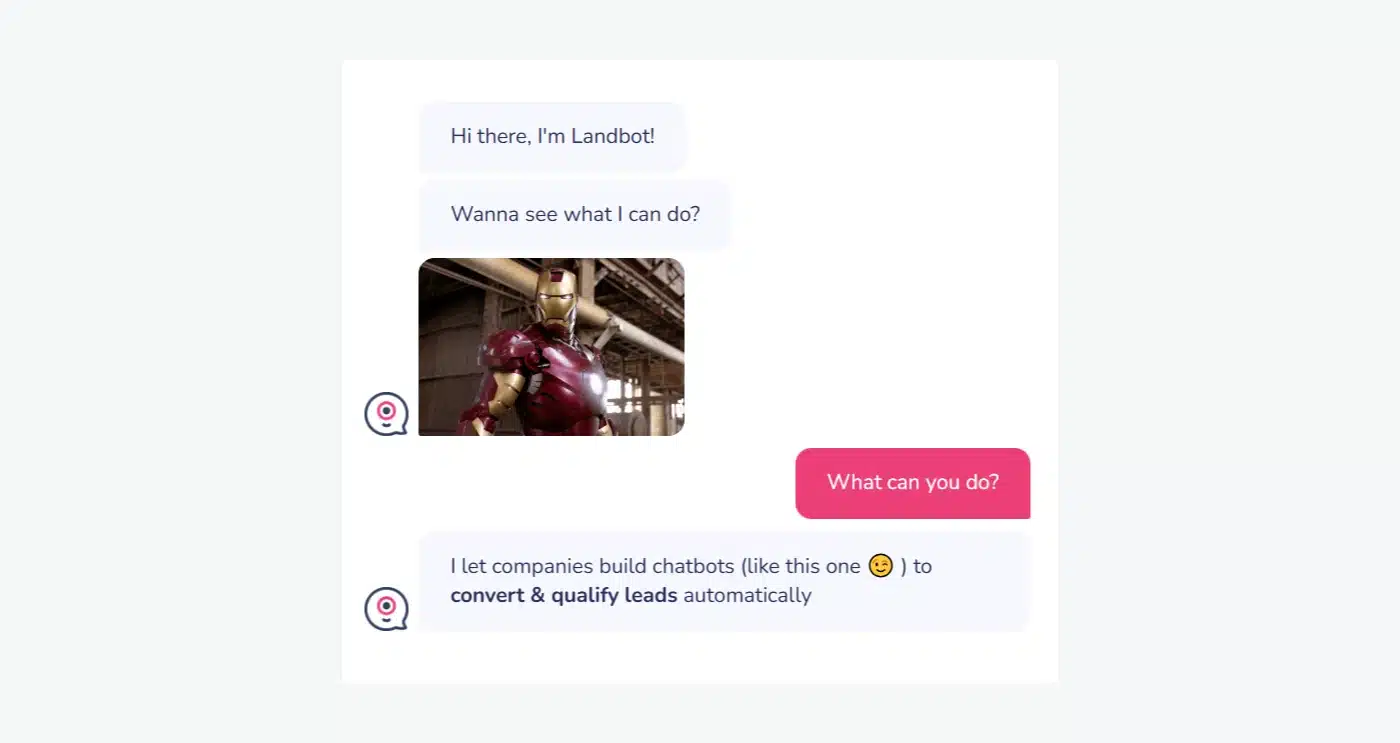
Rating: 4.7/5 ⭐️ (310+ reviews)
It’s no secret that landing pages are effective in introducing and promoting your products. But to make them even more efficient, you need to engage your visitors and invite them for a conversation. That’s what Landbot chatbot software does—it lets you build conversational landing pages and incorporate chatbots on any page of your website.
You can use their library of chatbot designs or create your own from scratch. This web bot software also offers a live chat widget and pop-ups that you can add to your website for more engagement with your visitors.
Pros:
- Many chatbot types available out of the box
- WhatsApp automation features
- Separate chat pages
Cons:
- No complex chatbot flow logic designs
- Sometimes the UI struggles and needs a refresh
- Free version available
- Starter ($40/mo)
- Pro ($100/mo)
- WhatsApp Pro ($200/mo)
- Business ($400/mo)
5. ManyChat
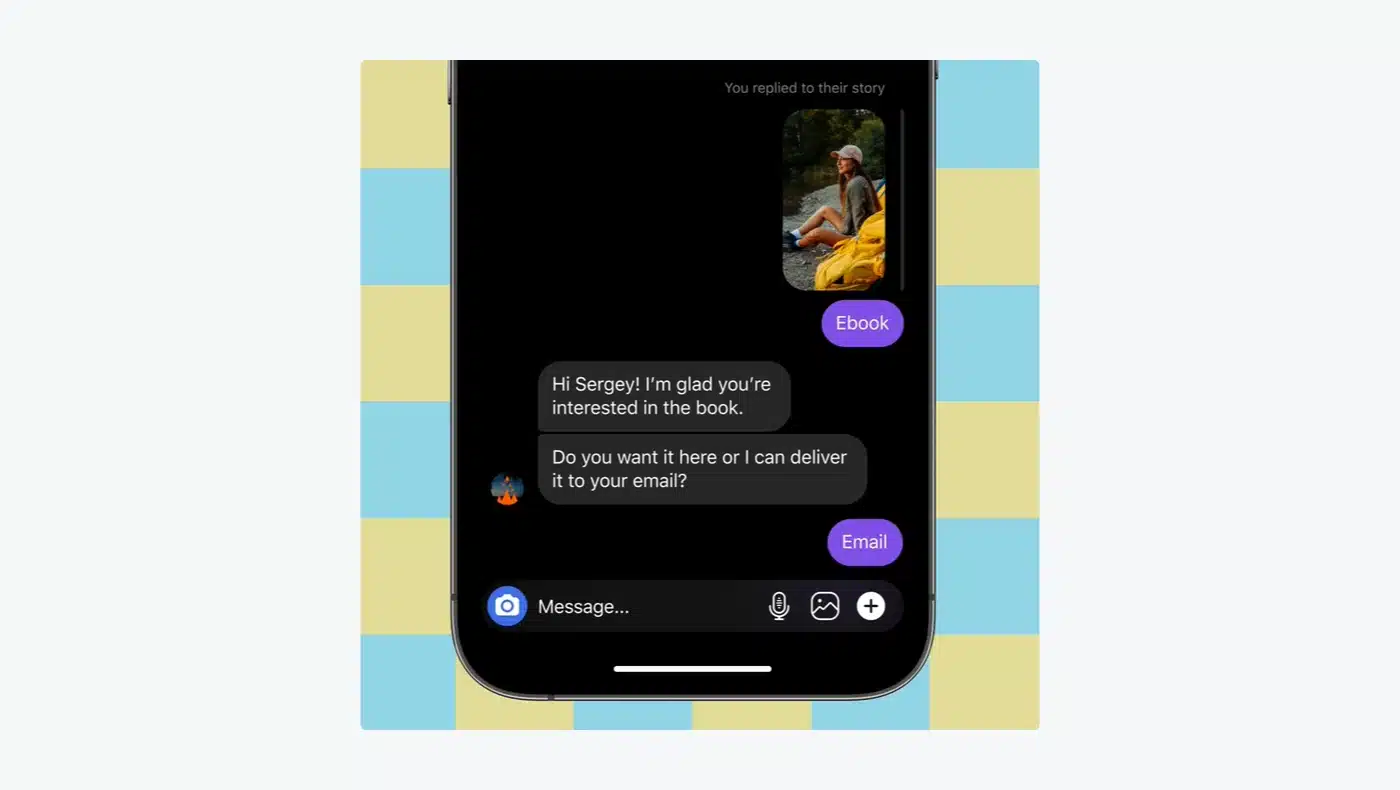
Rating: 4.6/5 ⭐️ (150 reviews)
ManyChat is a great tool for chatbot marketing, particularly via Facebook Messenger bots. It helps you drive marketing campaigns through SMS text messaging and social media channels, plus you can book appointments directly through the bot.
ManyChat is ideal for building customer relationships and generating more leads through social media. Also, with the help of ManyChat’s AI add-on, you can automate creating and managing direct messages (DM) for faster responses. It helps you handle follower interactions, qualify leads, respond to FAQs, and guide customers through purchasing decisions.
This chatbot software also offers rule-based ecommerce bots that can redirect subscribers who click on your ads to your Messenger bot, helping you collect more leads and boost sales.
Pros:
- Instagram, WhatsApp, and Facebook automation
- Tutorials and onboarding materials
- Appointment booking system
Cons:
- Basic analytics only
- Facebook-based platform
- Free plan available
- Pro ($15/mo)
- Elite → contact sales
Read more: Explore the best ManyChat alternatives available.
6. WATI
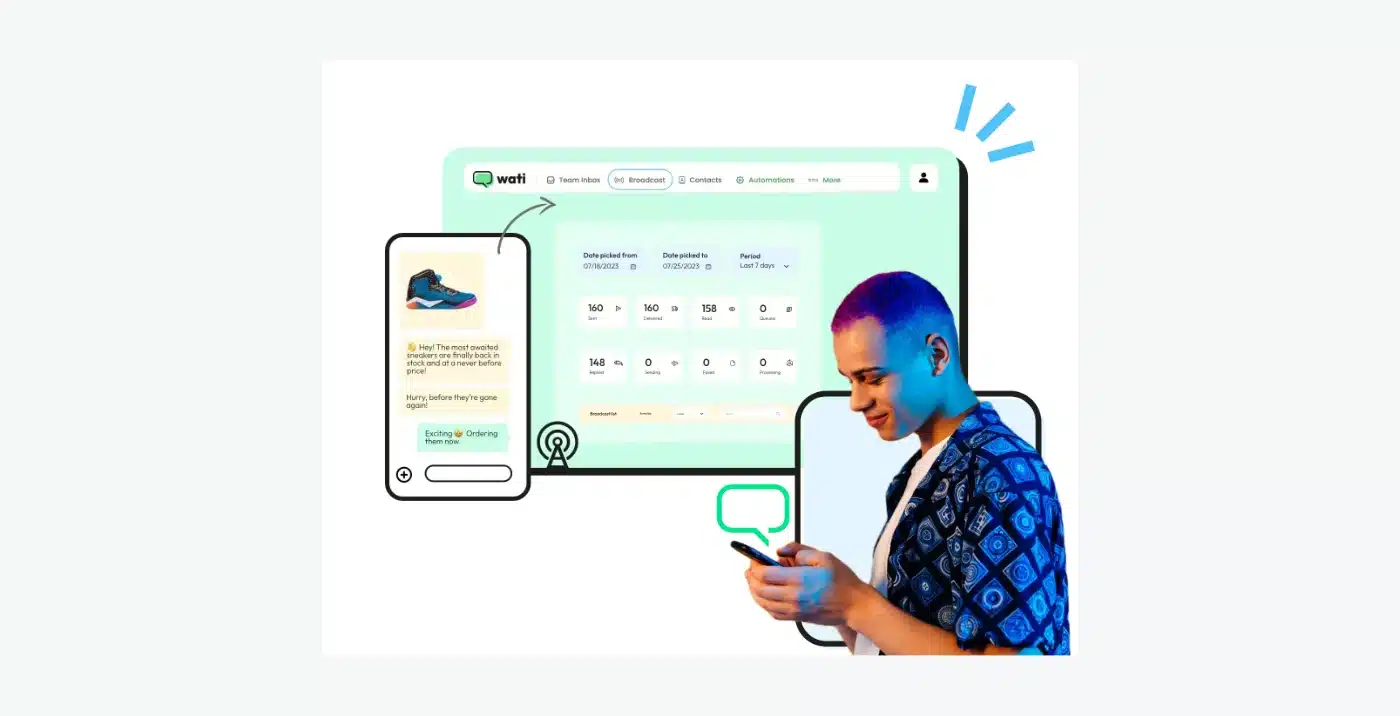
Rating: 4.6/5 ⭐️ (285 reviews)
If you are looking for WhatsApp chatbot software, this is it. WATI is an official WhatsApp Business partner, and it’s best suited for B2C companies that communicate with their customers over WhatsApp. It offers a mobile app for live chat conversations, so your human agents can answer shoppers even on the go.
Wati’s AI-powered chatbot, KnowBot, is designed to take care of those repetitive questions your customers often ask, making support easier for everyone. Using ChatGPT and other AI models, KnowBot creates natural, human-like conversations based on the data you provide.
Pros:
- No-code bot builder
- AI-powered chatbot
- Official integration with WhatsApp Business
Cons:
- Only available for WhatsApp
- The costs add up fast
- 7-day free trial
- Standard ($49/mo)
- Pro ($99/mo)
- Business ($299/mo)
7. FreshChat
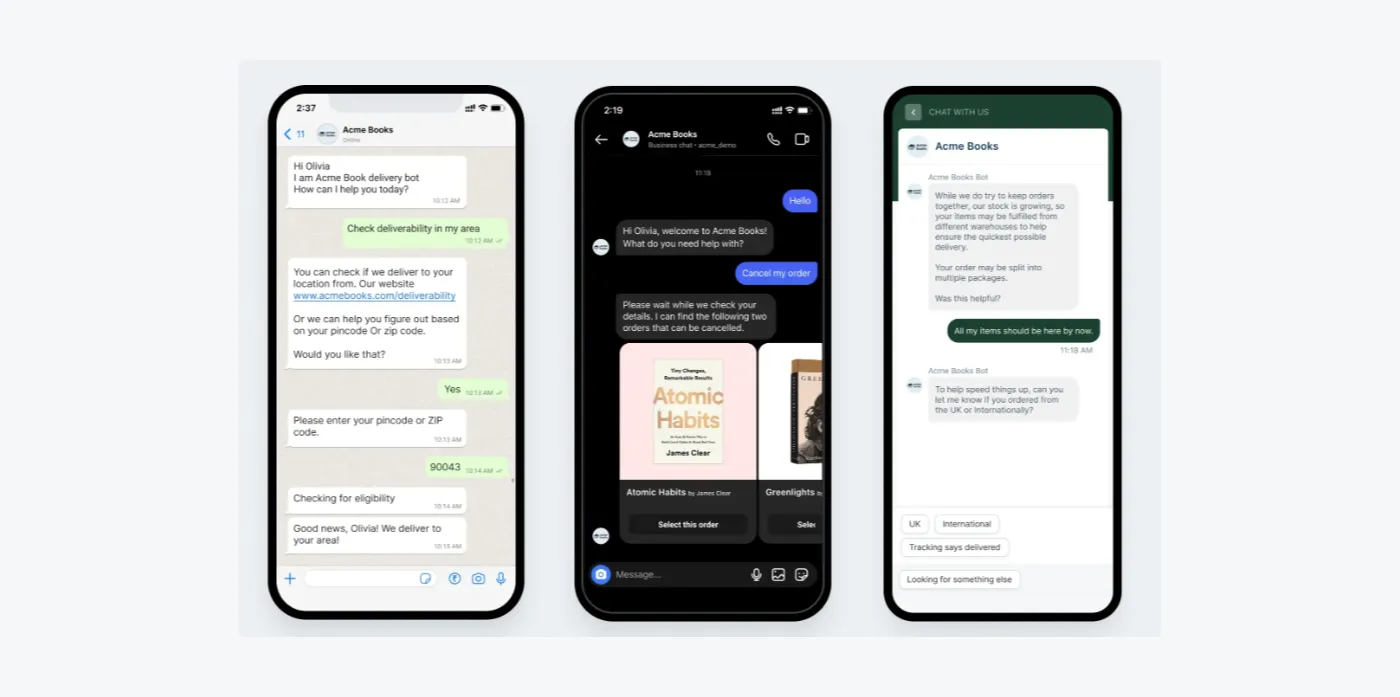
Rating: 4.4/5 ⭐️ (485+ reviews)
If you’re looking for a website no-code chatbot solution and need one with both help desk and sales tools, FreshWorks has you covered. Their suite of tools is built to meet your business’s customer support and sales needs, with easy-to-integrate options that work seamlessly together.
FreshChat, in particular, is a powerful live chat and built-in AI chatbot tool that lets you automate workflows, nurture leads, and set up email campaigns to run on autopilot. It also offers revenue and sales forecasting, along with customer insights collected by their chatbot, so you can make smarter, data-driven strategy decisions.
Pros:
- Multichannel support across the website, native app, and messaging platforms
- Advanced reporting and analytics
- Chatbot intent detection to get fast, personalized responses
Cons:
- Can be difficult to customize because it requires some coding
- Lack of third-party integrations
- Free plan available
- Growth ($23/mo/agent)
- Pro ($59/mo/agent)
- Enterprise ($95/mo/agent)
Read more: Explore the top Freshdesk alternatives available.
8. Chatfuel
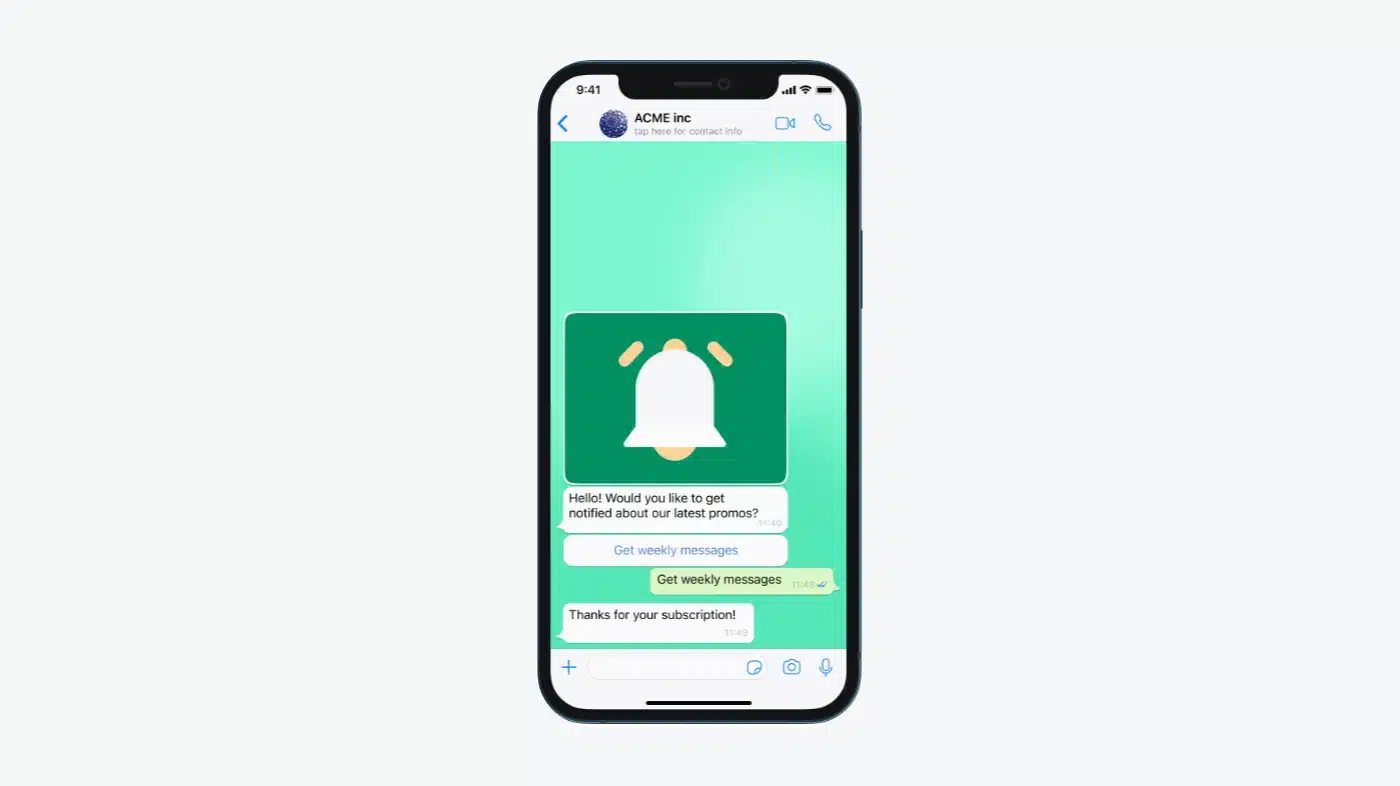
Rating: 4.5/5 ⭐️ (40+ reviews)
Chatfuel’s platform makes it easy for businesses to improve their customer service, lead generation, and sales through an intuitive, no-code setup. With seamless integration across social media channels like WhatsApp, Facebook Messenger, and Instagram, Chatfuel enables businesses to stay connected with customers wherever they are.
Its features include real-time auto-replies to FAQs, proactive chat messaging for abandoned carts and re-engagement, and algorithmic ad optimization to improve ad performance. Chatfuel’s partnership with Meta ensures secure integrations, while its built-in ChatGPT technology powers personalized and engaging conversations.
Pros:
- Chatbot templates available
- Integrations with Google Sheets, Hubspot, Shopify, Stripe
- Customer segmentation
Cons:
- Limited customization
- Mainly optimized for Facebook Messenger and Instagram
- Free trial available
- Entrepreneur (from $14.99/mo)
- Startup (from $24.99/mo)
- Small Business (from $59.99/mo)
- Growing Business (from $119.99/mo)
- Enterprise → contact sales team
9. DialogFlow
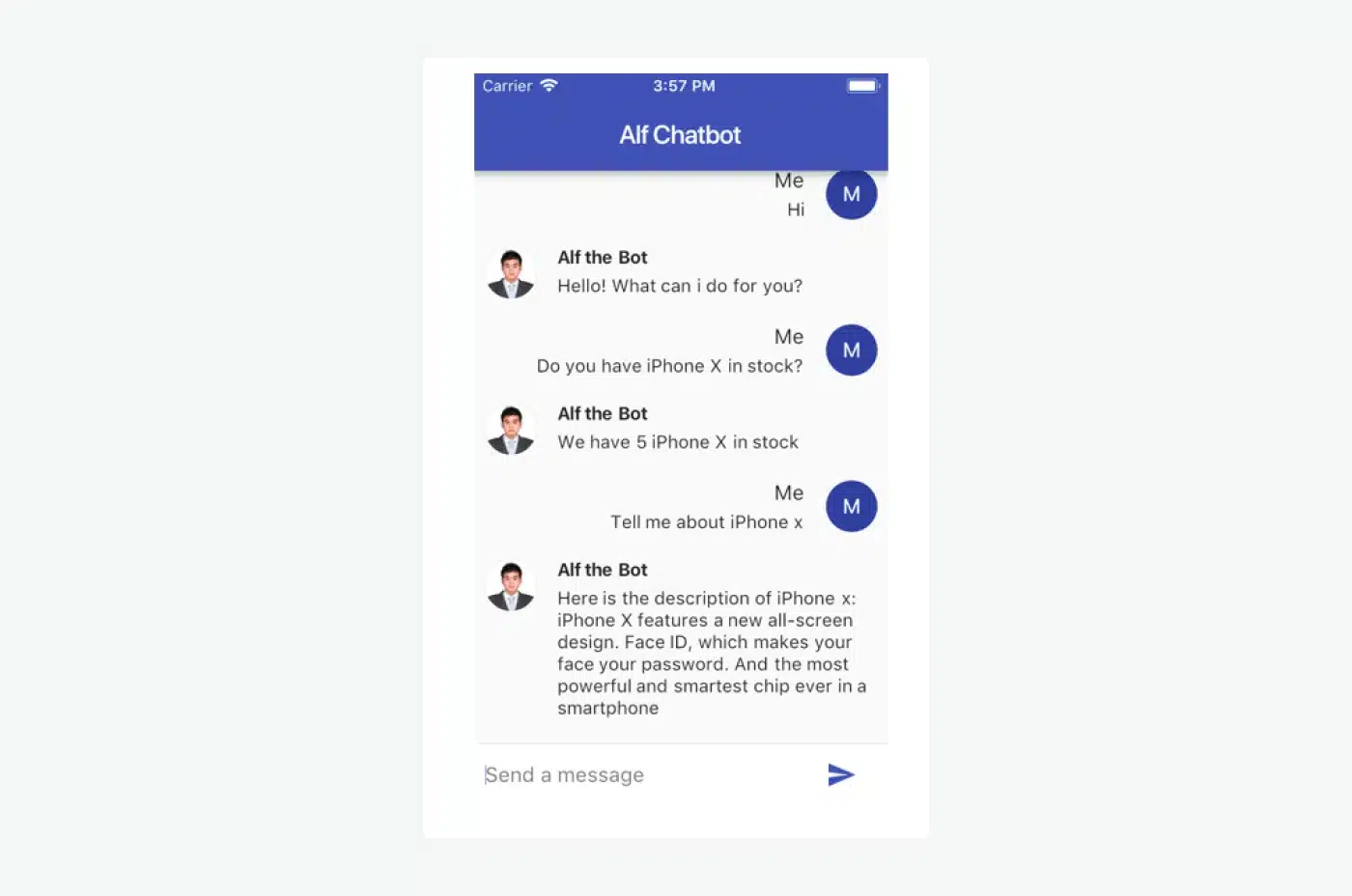
Rating: 4.3/5 ⭐️ (120+ reviews)
DialogFlow is an open-source chatbot software that uses Google AI to understand user intent. It offers the latest BERT-based natural language understanding (NLU) for more efficient support on complex queries.
You can also build text-based, as well as voice-based conversational interfaces that connect with a variety of channels and apps, such as Google Assistant and Slack. However, keep in mind that this is chatbot software for developers and you need to know programming languages to get the most out of it.
Pros:
- Voice-based assistance
- Sentiment analytics of inquiries
- Integration with IoT
Cons:
- No live customer support
- Coding knowledge needed
- $600 credit for a trial
- Text ($0.007/request)
- Audio input/output ($0.001/minute)
What to look for in chatbot software
When evaluating the best chatbot solutions for your company, it’s easy to get drawn in by all the extra features that some bot platforms offer. But unless you’re running an enterprise-level business, many of those bells and whistles aren’t necessary.
Instead, let’s focus on the features that truly make a difference.
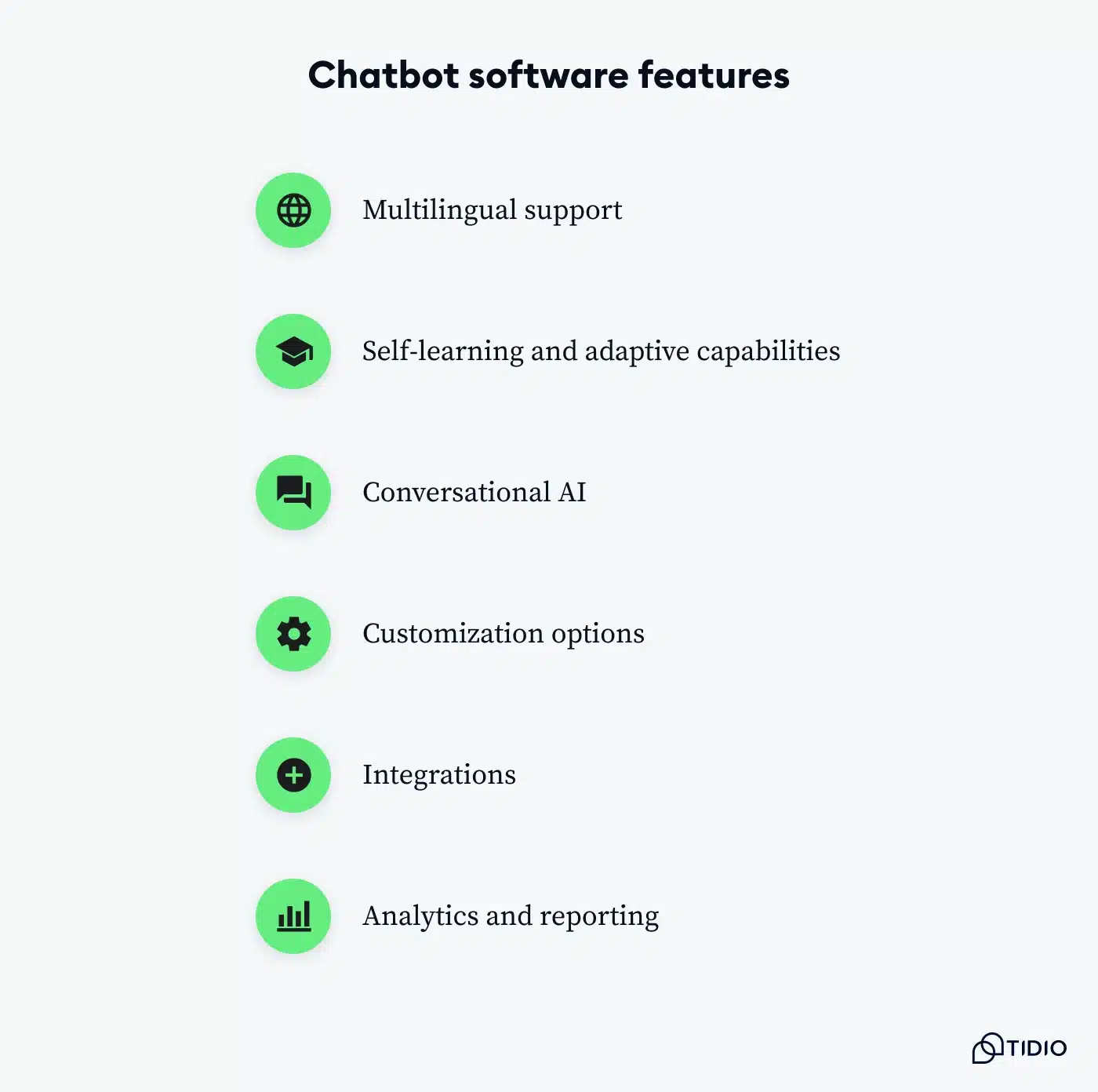
Multilingual support
If your business serves a global audience, multilingual support is a must. Top chatbot software providers, like Tidio’s Lyro AI, can automatically detect the user’s preferred language and translate responses in real-time. This makes your customer support accessible across borders, ensuring a smooth experience for all customers.
Self-learning and adaptive capabilities
If you want a low-maintenance chatbot that improves itself over time, look for providers built with self-learning and adaptive capabilities. Some platforms offer an AI assistant that learns from each interaction, allowing it to provide increasingly accurate and relevant responses. This saves time on manual updates and ensures that your chatbot is always able to handle evolving customer needs.
Conversational AI
An AI chatbot that can process information from a knowledge base and convey it to users in natural, conversational language is an extremely useful tool to have. This is especially true for industries like insurance, healthcare, and banking, where maintaining a thoughtful and professional tone is essential. By understanding user intent and delivering personalized, context-aware responses, AI chatbots help create interactions that feel genuine and human.
Customization options
Your chatbot should feel like a natural extension of your brand. Look for customization features that let you tweak messaging, adjust conversation flows, change widget colors, and personalize greetings. Some platforms even allow you to name your bot, giving it a distinct persona that aligns with your brand.
Integrations
A good chatbot integrates seamlessly with the tools and platforms you already use. Whether you need connections to messaging apps, ecommerce platforms like Shopify, or your CRM system, make sure the chatbot platform supports the integrations you need for a consistent multichannel customer service experience.
Analytics and reporting
Analytics and reports are essential for keeping your chatbot running at its best. They show how well the bot handles conversations, if users are happy with the experience, and how often chats need to be passed to live agents. With these insights, you can fine-tune your bot’s interactions and boost its effectiveness, ensuring it always meets customer needs.
Key chatbot analytics include average response times, resolution rates, customer satisfaction scores, and user engagement metrics, giving insights into performance and user experience.
Read more: Here are key customer service metrics you should consider for your business.
How can chatbot software help your business?
Chatbots are more than just quick-answer tools—they’re essential for meeting modern customer expectations and delivering great service that keeps people coming back.
Here are the major ways chatbots can benefit your business:
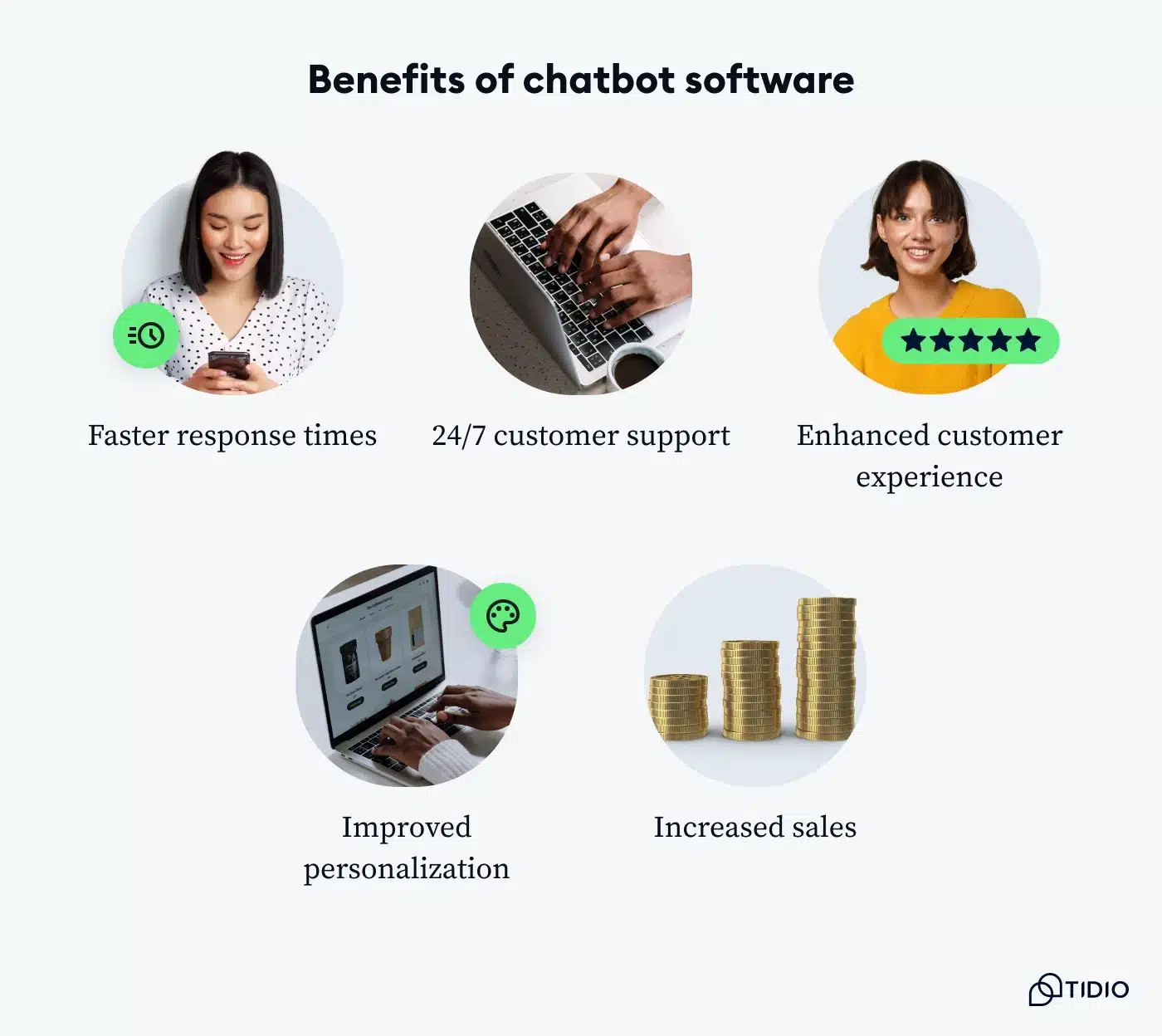
- Faster response times — Research shows 69% of customers prefer chatbots for quick responses, and our own research revealed that 62% would rather choose a bot over waiting 15 minutes for a human rep. Chatbots reply in seconds, so customers don’t have to wait in a queue just for a simple answer.
- 24/7 customer support — Chatbots don’t take breaks, offering around-the-clock service for your customers. This is important, especially since 51% of consumers expect 24/7 availability nowadays. With a chatbot, your brand can support customers during off-hours when they’re more likely to shop online.
- Enhanced customer experience — 46% of clients expect a response within four hours (versus the 12-hour industry average), and chatbots meet these high standards by ensuring quick replies. This leads to higher customer satisfaction, which plays a big role in driving your business growth.
- Improved personalization — Just like your favorite coffee shop remembering your usual order, chatbots personalize every experience and tailor each customer journey.
- Increased sales — Chatbots actively address common pain points like checkout doubts and cart abandonment. By proactively engaging customers through exclusive deals, chatbots can significantly boost conversions and increase the likelihood of a sale.
Get started with the most powerful AI chatbot software
Choosing the right chatbot software can make all the difference in how you engage with customers. Chatbots make it easy for visitors to start conversations with your business, and by integrating them across platforms like messaging apps and social media, you become accessible to shoppers anytime, anywhere.
To find the best fit for your needs, focus on your must-have features and look for a provider with robust AI capabilities, customization options, and seamless integrations.
Tidio is a top choice in this category, offering flexibility with rule-based and AI chatbots, including Lyro, which learns from your website’s content and handles customer queries with minimal setup. With Tidio, you get a powerful, adaptable chatbot solution that’s ready to support your business wherever your customers are.

Lyro AI can be trained in just a few steps. You just click “Set up Lyro AI,” train it with a link to your website or by uploading your knowledge base or FAQs, customize its tone and predefined responses to match your brand, and activate the chatbot. From there, Lyro handles customer queries with instant, accurate answers based on the information it’s been trained on.
Be sure to give Tidio’s Lyro AI a try for free right now—no credit card required!
Level up your customer service with the best AI chatbot software
Frequently Asked Questions
Absolutely! Many platforms, including Tidio, offer free plans that let you get started with essential chatbot features at no cost. This is perfect for testing the waters without a big investment.
There are four main types of chatbots:
Rule-based chatbots — these follow pre-set paths and responses.
AI chatbots — they use machine learning to chat more naturally with users.
Hybrid chatbots — a mix of rule-based and AI capabilities for flexible responses.
Voice-enabled chatbots — these respond to voice commands and are often found in smart devices like speakers.

